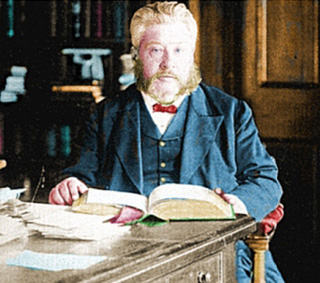Go ye, serve the Lord; only let your flocks and your herds be stayed.” Exodus 10 v 24
 Just so. What does Moses say to that? “Thou must give us also sacrifices and burnt-offerings, that we may sacrifice unto Jehovah our God. Our cattle also shall go with us; there shall not a hoof be left behind; for thereof must we take to serve the Lord our God; and we know not with what we must serve the Lord, until we come thither.” This was the divine policy of “No surrender,” and I plead for it with you. Satan says, “Do not use your property for God. Do not use your talents and your abilities; especially, do not use your money for the Lord Jesus. Keep that for yourself. You will want it one of these days, perhaps. Keep it for your own enjoyment. Live to God in other things, but, as to that, live to yourself.” Now, a genuine Christian says, “When I gave myself to the Lord I gave him everything I had. From the crown of my head to the sole of my foot I am the Lord’s. He bids me provide things honest in the sight of all men, and care for my household; and so I shall; but yet I am not my own, for I am bought with a price; and therefore it becomes me to feel that everything I have, or ever shall have, is a dedicated thing, and belongs unto the Lord, that I may use it as his steward, not as if it were mine, but at his discretion, and at his bidding. I cannot leave my substance to be the devil’s. That must come with me, and must be all my Lord’s; for his it is even as I am.”
Just so. What does Moses say to that? “Thou must give us also sacrifices and burnt-offerings, that we may sacrifice unto Jehovah our God. Our cattle also shall go with us; there shall not a hoof be left behind; for thereof must we take to serve the Lord our God; and we know not with what we must serve the Lord, until we come thither.” This was the divine policy of “No surrender,” and I plead for it with you. Satan says, “Do not use your property for God. Do not use your talents and your abilities; especially, do not use your money for the Lord Jesus. Keep that for yourself. You will want it one of these days, perhaps. Keep it for your own enjoyment. Live to God in other things, but, as to that, live to yourself.” Now, a genuine Christian says, “When I gave myself to the Lord I gave him everything I had. From the crown of my head to the sole of my foot I am the Lord’s. He bids me provide things honest in the sight of all men, and care for my household; and so I shall; but yet I am not my own, for I am bought with a price; and therefore it becomes me to feel that everything I have, or ever shall have, is a dedicated thing, and belongs unto the Lord, that I may use it as his steward, not as if it were mine, but at his discretion, and at his bidding. I cannot leave my substance to be the devil’s. That must come with me, and must be all my Lord’s; for his it is even as I am.” The Christian takes the line which Moses indicated: “I do not know what I may be required to give. I know that I am to sacrifice unto the Lord my God, and I do not know how much. I cannot tell what may be the needs of the poor, the needs of the church, the needs of Christ’s church all over the land. I do not know, but this I know, that all that I have stands at the surrender point. If my Redeemer wants it he shall have it. If Satan wants it he shall not have a penny of it. If there be anything that is asked of me that will not conduce to good morals—that will not conduce to the promotion of that which is right in the sight of God—I withhold it. But if there be anything that is for Christ’s glory and for the good of men, then, as the Lord shall help me, it shall be given freely, and not be begrudged as if it were a tax. It shall be my joy and my delight to devote all that I am, and all that I have, to him who bought me with his precious blood.”
Now, brothers and sisters, you that profess to be Christians, come you, stand right square out, and own yourselves wholly and altogether the Lord’s.
“’Tis done! the great transaction’s done;
I am my Lord’s, and be is mine.”
“My house is his, and my all is his. Whether I live or die—whether I work or suffer, all that I am, and all that I have, shall be for ever my Lord’s.” This is to enter into peace: this indeed is to be clean delivered from the power of Satan; this is to be the Lord’s free man; and what remains but with joyful footsteps to go onward toward Canaan, shod with shoes of iron and brass, fed with heavenly bread, guarded by the Lord himself, guided by his fiery-cloudy pillar, enjoying all things in him, and finding him in all things? This is to be a Christian of the true order. The Lord make you so by faith in his dear Son! Amen and Amen.
Spurgeon, C. H. (1885). The Metropolitan Tabernacle Pulpit Sermons (Vol. 31, pp. 163–164). London: Passmore & Alabaster.

Comments